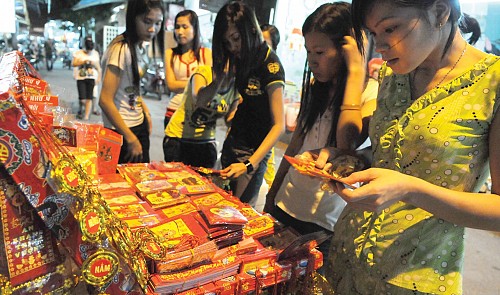Significance of lucky money at Tet
Many traditional customs are followed over the Vietnamese Lunar New Year, including honouring ancestors’ spirits, visiting close relatives on the first day of the Lunar New Year, and exchanging New Year wishes with relatives, neighbours and friends.
One special tradition is the giving of li xi, or lucky money, to children and elders. This Tet custom is a way of wishing both children and the elderly good luck, good health, success, and happiness in the year ahead.
Local people stay up late on New Year’s Eve to celebrate the arrival of the new year and to observe traditional rituals dedicated to greeting their ancestors’ spirits as they return to the family for the occasion.
 |
| Vietnamese women buying red envelopes for li xi |
Despite this, they then wake up early the next morning, put on their best clothes, and the entire family, usually multi-generational, gathers in the living room to welcome in the Lunar New Year.
Children will respectfully fold their arms in front of their chests and, facing their parents and grandparents, give them their best wishes for a “Happy New Year” or “good health and longevity”.
The adults, in return, give them li xi and extend their wishes to the children for “eating well and growing up healthy” and “happiness and prosperity” for all the family members. Any guests give the children li xi as well.
To rejoice over or pray for happiness and longevity, on the first morning of Tet adults congratulate their children on becoming a year older by presenting them with red envelopes containing some freshly-minted banknotes.
According to traditional beliefs, the money in the red envelopes, usually in nominal quantity, bears a symbolic meaning while the red colour of the envelopes symbolises good luck and is supposed to ward off evil spirits.
Giving li xi during the Lunar New Year is considered fortunate for both the giver and the receiver. Those who give are believed to invite the flow of money into their house during the entire year. The giving of li xi implies that the family’s fortune will be passed on to the children and the unmarried teens or adults.
Li xi should be kept and not spent immediately, which is a way to encourage young people to save money. In Viet Nam, red envelopes are also used to give payments for favourable services to lion dance performers and religious practitioners during the Lunar New Year.